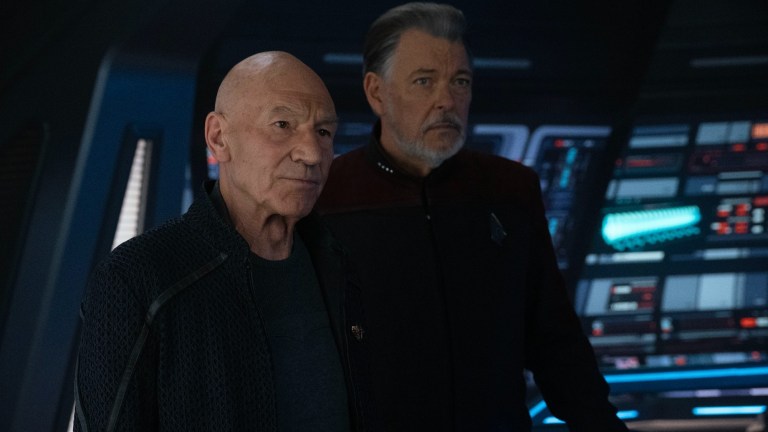Star Trek: Picard Season 3 Episode 5 Review – Imposters
A surprise character return provides a powerful emotional linchpin for an episode that's otherwise pretty focused on setting up Star Trek: Picard's endgame

This Star Trek: Picard review contains spoilers.
Star Trek: Picard Season 3 Episode 5
Now that the U.S.S. Titan has successfully escaped the existential threat of death in a gravity well (and completed a truly outstanding quasi-two-parter in “Seventeen Seconds” and “No Win Scenario”), Star Trek: Picard slows down a bit. “Imposters” is an hour that is, admittedly, mostly table setting for the back half of the season, as the show moves various pieces into place to finally bring its disparate plots together. Yet, because Picard seems to have learned—at long last—that it’s at its best when it’s wrestling not just with the broader legacy of The Next Generation, but the way that legacy has impacted the lives of others, the episode is still more emotionally compelling than any installment that’s predominantly about Changeling physiology has any right to be.
The big reason for the episode’s success is the surprising return of Bajoran commander Ro Laren (Michelle Forbes), a character who has a complex history with Picard, Riker, and Starfleet itself. Though her time on The Next Generation ended with her decision to ultimately defect and join the resistance group known as the Maquis, an act Picard viewed as a deeply personal and professional betrayal, Picard reveals that Ro has returned to the organization she once abandoned, was court-martialed, went to prison, and is now an official investigator, charged with leading the probe into the potential treason Picard and Riker committed by commandeering the Titan in the first place. Though by episode’s end, we learn she’s been digging into the “Changeling problem” in secret.
The complicated dance of regret, anger, and, yes, genuine affection that still clearly exists between Picard and Ro is the emotional engine that powers the bulk of the episode, and Patrick Stewart and Michelle Forbes are, unsurprisingly, still absolutely fantastic together. That Picard, a man who has given so much to Starfleet, is still angry about Ro’s defection makes plenty of sense, but what Stewart’s performance reveals is how personally he took her decision, and, in fact, how genuinely hurt he was by it. The same, intriguingly enough, can also be said for Ro, who clearly still longs for the approval of the man who first gave her a chance, and is apparently equally hurt that his belief in her couldn’t go far enough to trust that she had a genuine belief in and reason for the choices she made so long ago.
That “Imposters” actually does a fairly great job of making you wonder whether this is the real Ro or a Changeling in disguise, even as it makes your heart break for the relationship that might have been between these two people, is particularly impressive. (And kind of makes you weep for the lack of similar nuanced and careful writing over the past two seasons of Picard, but at least we have it now, I suppose.) That the sharp jagged edges of their memories are ultimately what allows them both to prove they each are who they say they are is the sort of twist that works perfectly on both an emotional and narrative level.
This is an argument these two people have been waiting three decades to have, and it plays out with all the associated anger, hurt, and misconceptions that each of them has been carrying for so long. And the best part, as is so often the case in all good conflicts, is that they both valid points to make. She did betray all the principles he most believed in, and by extension, their relationship. But he often does conflate morality and duty, and he believed in her most only when it was easiest for him to do so.
The most human of emotions—love, pain, hurt—are what ultimately convince them to trust one another, and it’s such an incredible sequence that it is even more heartbreaking to realize it is the last the two will ever share. That they come to something like a fragile reconciliation before Ro heroically blows herself up to give Team Titan a chance to escape the Changeling-compromised U.S.S. Intrepid is, in hindsight, almost completely predictable, yet a complete gut-punch to watch unfold.
“Imposters” still suffers from some unfortunate pacing problems: sadly, Raffi and Worf’s excellent adventure remains Picard‘s weakest element. Every time the episode shifts its focus away from the high-tension situation building aboard the Titan, it struggles to maintain anything close to momentum — no matter how much fun it is to watch Michael Dorn sling Klingon weaponry around and proclaim today is a good day to die. But, thanks to Ro’s big revelation—that Starfleet itself is compromised even at the highest levels of command and she’s been working under deep cover to try and suss out both who’s behind it and how to stop it—it appears that we’ll finally see season 3’s two major narrative threads intersect for good next week.
How Jack Crusher fits into all this is still anyone’s guess, though, and “Imposters” does little to clarify what, precisely, is going on with him. Why is he hearing voices and having visions? How does he suddenly have bizarre powers like he’s the Star Trek version of Eleven from Stranger Things? Is he in control of these abilities or do they just surface at random? And is there a reason this appears to be the first time he’s ever mentioned any of these extremely concerning issues to his mother, who is, after all, one of the most renowned medical doctors in Starfleet?
If the show hadn’t already spent so much time and emotional energy on the whole “Picard’s long lost son with Beverly” subplot, I’d be inclined to assume that Jack is somehow an evolutionary answer to the Changelings’ improved ability to hide in plain sight since he appears to be able to pick them out much more easily than normal humans. But that’s a little too heavy-duty Chosen One vibes even for me at this point. So what is it? Maybe next week we’ll finally find out.


